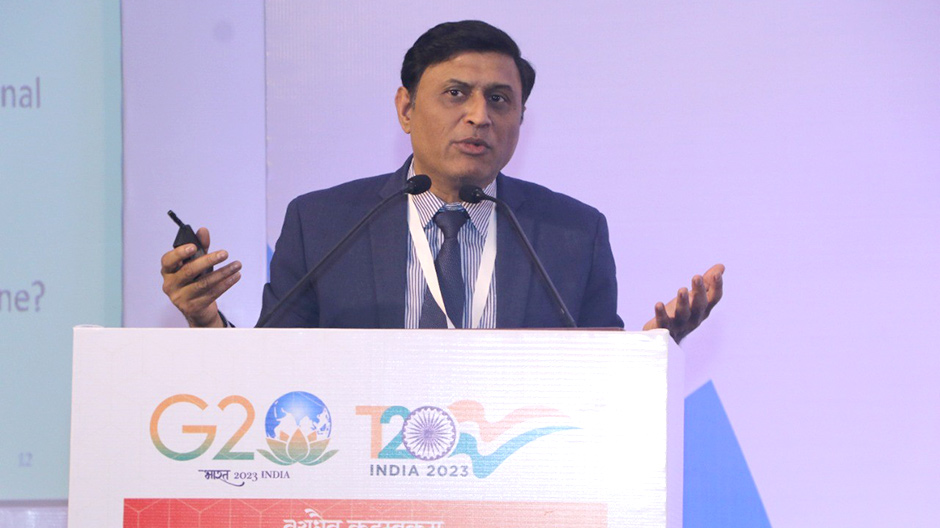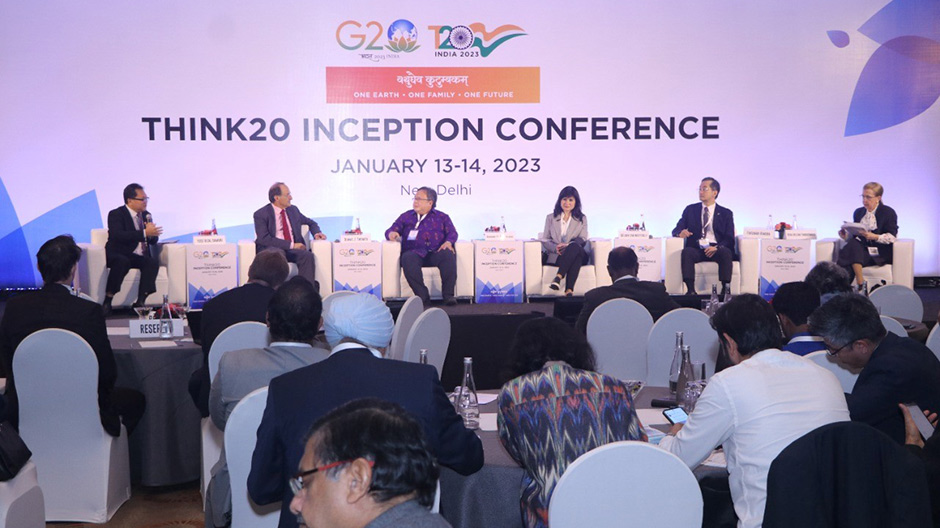Spotlight: Deepak Mishra, Chair, Task Force 5 and Director and Chief Executive, ICRIER, India
Speakers:
- Dennis J. Snower, Founder and President, Global Solutions Initiative, Germany
- Bambang P.S. Brodjonegoro, Professor, Faculty of Economics, University of Indonesia, Indonesia
- Fukunari Kimura, Chief Economist, ERIA, Japan
- Vera Helena Thorstensen, Head, Center for Global Trade and Investment Studies, FGV, Brazil
- Gülbin Şahinbeyoğlu, Center Director, Economic Data Analysis Center, TEPAV, Turkey
Chair: Yose Rizal Damuri, Executive Director, Centre for Strategic and International Studies (CSIS), Indonesia
Supply-demand mismatches, increase in commodity prices including energy and food prices have given rise to inflationary pressures in several G20 countries. How can the G20 continue to monitor major global risks, including macroeconomic vulnerabilities and geopolitical implications to undertake a systematic approach to mitigate the risks? Given the extraordinary level of monetary and fiscal stimulus, how can the G20 address the systemic structural transformations (including green and digital), reduce risk-enhancing inequalities, and increase supply-chain resilience to future economic shocks?
Deepak Mishra set the stage for the plenary session on Global Financial Order and Macroeconomic Stability. He mentioned that India’s G20 Presidency has come at a time of considerable external scepticism of the grouping because the global economy is in bad shape. He highlighted that global growth rate is at an all-time low and the recessions have become more pronounced over time. Accordingly, many countries have taken unprecedented monetary and fiscal policies leading to a massive build up in public sector debt. However, the rate of increase in debt is far higher in emerging economies.

In the context of the G20, he asked whether the G20 has inadvertently led to excessive synchronisation? Should modern monetary policies account for the global spill over effects? Is there scope for better coordination and transparency across national commodity price stabilisation funds? Should the middle income countries be included in the common framework for debt and should there be G20-wide safety nets like G20 swap lines?
Subsequently, Yose Rizal Damuri highlighted the problems that the world currently faces and its impact on the global recovery agenda. He asked Dennis J. Snower what can India’s Presidency do to bridge the diverse interest among member countries, to which he stated that the Indian G20 Presidency has a unique opportunity in digital transformation, in moving away from standard monetary and fiscal policies to ‘adaptation policies’, and in promoting the idea that we need to come together as a global community.
Bambang P.S. Brodjonegoro spoke about what the G20 can do to reduce the consequences of erratic normalisation, and whether India’s Presidency can come up with a better exit strategy. He stated that recovery from the global financial crisis is different from the recovery from the pandemic, especially in terms of demand. He stated that the G20 members should also deal with the production and supply side of the economy, and see how to address the supply side disruptions, including supply chain disruptions and workforce limitation issues.
Gülbin Şahinbeyoğlu highlighted the debt distress and the possible solutions that the G20 can offer in this regard. She mentioned that monetary and fiscal policy measures in advanced economies should be responsible, and fiscal policy measures should not add to already high inflationary pressures. She stated that fiscal spending can be reprioritised, and measures should create fiscal space for vulnerable economies. The G20 common framework for debt needs to be renewed, made more transparent, and extended to middle income countries.
Fukunari Kimura answered the question on addressing global supply challenges and economic decoupling. He stated that for economic development, we need trade and development and a rules-based trading system. He also highlighted the changing nature of sanctions and restrictions and their impact on economic activities. He mentioned that the world will witness a partial de-coupling of supply chains and not a complete decoupling of supply chains.
Vera Thorstensen spoke on whether the G20 can offer solutions to the international trade and governance problems. She also spoke about subsidisation in new fields and the need for regulation. She then stated that developing countries should play a key role in shaping the new trading system. Thorstensen stated that while plurilateral initiatives are important, it is important to transform the treaties by making guidelines.
For their concluding remarks, the speakers highlighted the role of Think20 (T20) in the G20 process and how it can be made more effective. Bambang said that the T20 should remind the government to prioritise the recovery in the direction of sustainability and digital transformation. Snower stated that it should advise the G20 to address global problems globally and not nationally. Kimura pointed out that T20 and G20 should provide a balanced view to the G7 and highlight the importance of active trade and investment. Gülbin noted that the T20 should act as the innovation forum and think freely to contribute, whereas Thorstensen said that the T20 is not constrained, and it is not advisable to de-couple trade. Damuri concluded the discussion by stating that we need the G20, and it is our responsibility to make the process more meaningful.
Watch the full session here.
This event report has been compiled by Urvi Tembey, Associate Fellow, ORF.




